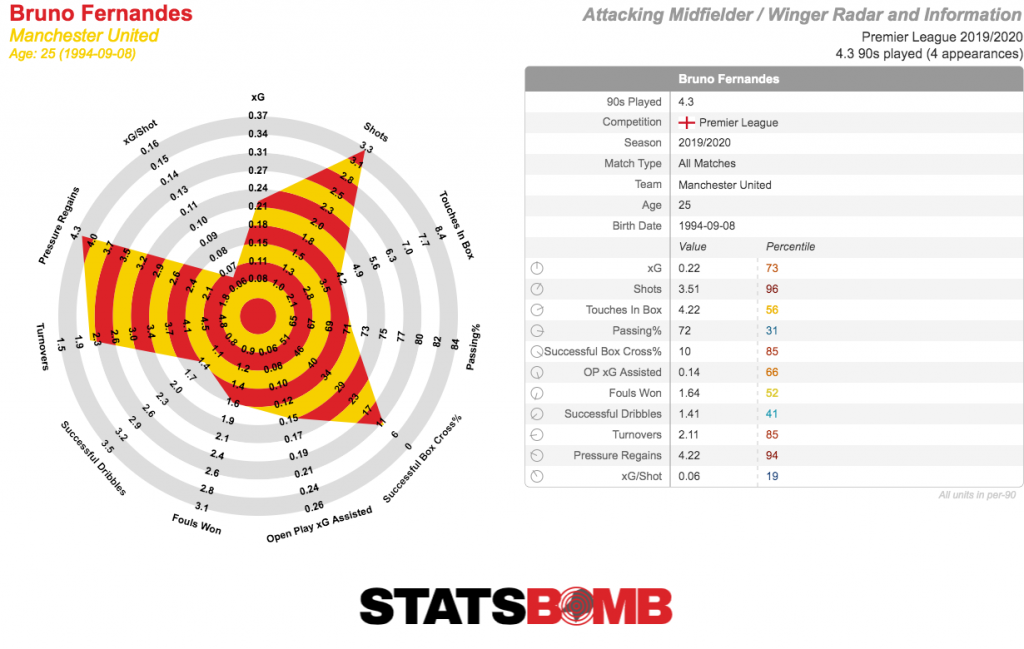Arsenal had a fairly stark choice in 2018 between Unai Emery and Mikel Arteta. Apparently, they think they got it wrong. Emery was a justifiable, if uninteresting, choice to replace Arsène Wenger in theory. In practice, it just didn’t work at all. Former chief executive Ivan Gazidis claimed on his appointment that Emery was hired due to his “progressive, entertaining football, a personality that fits with Arsenal's values and also a record of developing players, in particular young players”. I cannot think of a strong argument that he proved suitable at any of those three tasks. Emery’s Arsenal were primarily a reactive side, shifting tactical approach from week to week and relying primarily, but not exclusively, on experienced players. This might have been acceptable if they were any good at it. But the underlying numbers paint an even worse picture than the results. During Emery’s time in charge, Arsenal had an expected goal difference per game of +0.05, meaning they barely created better chances than their opponents overall. This was down from Wenger’s final season at both ends, but the attack especially took a hit. 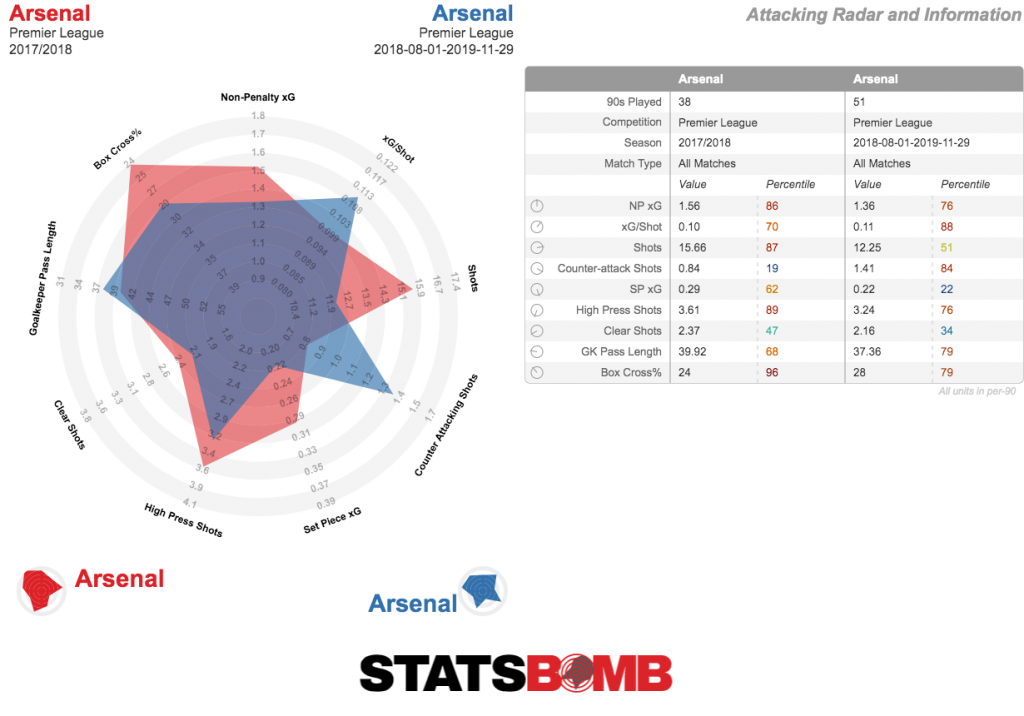 Arteta wasn’t necessarily hired to fix things quickly, or to push for a Champions League spot. It would have been nice, but that's not where Arsenal are right now. His job is one for the long haul, implementing a much more proactive style of football and developing young players alongside the desperately needed new signings in the next several windows. With those limitations acknowledged, it’s not a shock that Arteta’s Arsenal don’t look much better in quantitative terms. In pure results, the side have 14 points from the last nine fixtures. Under the hood, we’re looking at an xG difference per game of -0.02. This feels a lot worse than the Emery era because it’s a negative number, but we’re talking about a very small difference. In all of nine games, Arsenal have been about as effective as they were for the previous 18 months. The xG trendlines look a mess because Arsenal haven’t shown much discernable progress, decline, or anything, really, since Wenger left.
Arteta wasn’t necessarily hired to fix things quickly, or to push for a Champions League spot. It would have been nice, but that's not where Arsenal are right now. His job is one for the long haul, implementing a much more proactive style of football and developing young players alongside the desperately needed new signings in the next several windows. With those limitations acknowledged, it’s not a shock that Arteta’s Arsenal don’t look much better in quantitative terms. In pure results, the side have 14 points from the last nine fixtures. Under the hood, we’re looking at an xG difference per game of -0.02. This feels a lot worse than the Emery era because it’s a negative number, but we’re talking about a very small difference. In all of nine games, Arsenal have been about as effective as they were for the previous 18 months. The xG trendlines look a mess because Arsenal haven’t shown much discernable progress, decline, or anything, really, since Wenger left. 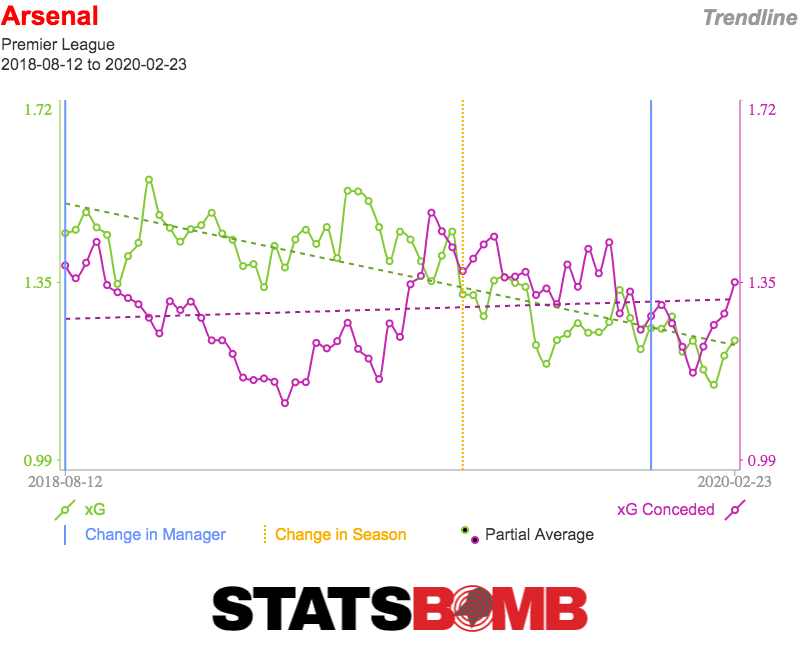 So what is Arteta doing? He’s certainly changing the team in certain ways that can be quantified. The xG conceded per game is identical under the two managers, but Arteta’s side concede slightly fewer shots. Not a huge difference, but we’re talking about the same players here. This is what we’d expect to see from a manager who wants to press and dominate the game: better control of the shot count, but a risk of being cut open when opponents break the press. As for the actual pressing, we’re not seeing a lot of evidence for it in the numbers. Arsenal’s defensive distance—how high up the pitch they make a defensive action on average—is actually lower under Arteta. The Gunners now allow slightly more passes before making an attempt to win the ball back. The intent is there, but Arsenal do not yet have anything resembling a coordinated press. The question, then, is much more about what Arteta can do than what he is doing. He maintains the broad 4-2-3-1 shape Arsenal have played for the last 20 years, though he’s been flexible enough with personnel that the emphasis can change. I’m sure everyone reading this already has strong opinions on both parts of the David Luiz–Shkodran Mustafi centre back pairing he currently favours, so we’ll just move past the subject. Héctor Bellerín has returned from a long injury, so we’ll give him some time to get back to full speed before making a judgement. At left back, there’s no doubt that Bukayo Saka looks quite exciting, but with the way his numbers have dropped off in recent weeks, it seems like the 18-year-old could do with a break to catch his breath.
So what is Arteta doing? He’s certainly changing the team in certain ways that can be quantified. The xG conceded per game is identical under the two managers, but Arteta’s side concede slightly fewer shots. Not a huge difference, but we’re talking about the same players here. This is what we’d expect to see from a manager who wants to press and dominate the game: better control of the shot count, but a risk of being cut open when opponents break the press. As for the actual pressing, we’re not seeing a lot of evidence for it in the numbers. Arsenal’s defensive distance—how high up the pitch they make a defensive action on average—is actually lower under Arteta. The Gunners now allow slightly more passes before making an attempt to win the ball back. The intent is there, but Arsenal do not yet have anything resembling a coordinated press. The question, then, is much more about what Arteta can do than what he is doing. He maintains the broad 4-2-3-1 shape Arsenal have played for the last 20 years, though he’s been flexible enough with personnel that the emphasis can change. I’m sure everyone reading this already has strong opinions on both parts of the David Luiz–Shkodran Mustafi centre back pairing he currently favours, so we’ll just move past the subject. Héctor Bellerín has returned from a long injury, so we’ll give him some time to get back to full speed before making a judgement. At left back, there’s no doubt that Bukayo Saka looks quite exciting, but with the way his numbers have dropped off in recent weeks, it seems like the 18-year-old could do with a break to catch his breath. 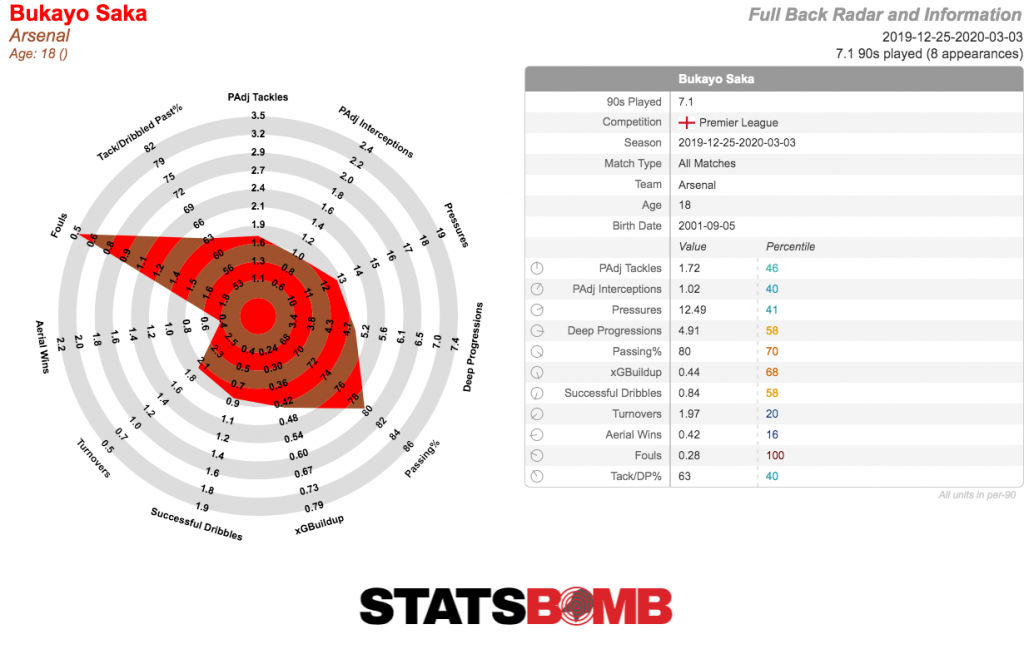 Granit Xhaka is another player everyone surely has an opinion on by now. So far under Arteta he’s been the most extreme form of himself, offering a genuine ball progression outlet, but he’s been—to put it politely—less than active out of possession. His numbers have been generally declining over the past few seasons, so it is something of a concern. He always has a moment of stupidity in him, but you already knew that.
Granit Xhaka is another player everyone surely has an opinion on by now. So far under Arteta he’s been the most extreme form of himself, offering a genuine ball progression outlet, but he’s been—to put it politely—less than active out of possession. His numbers have been generally declining over the past few seasons, so it is something of a concern. He always has a moment of stupidity in him, but you already knew that. 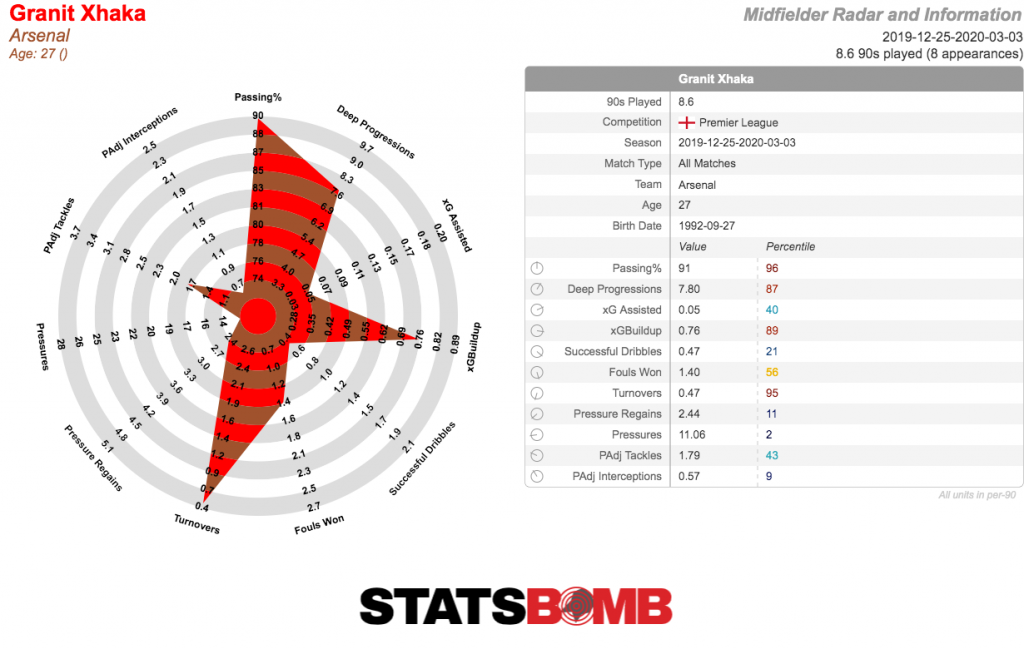 Finding a partner for him is a different matter. Dani Ceballos came into the side recently, but he’s leaving in the summer. Mattéo Guendouzi has his qualities, but both players’ concentration lapses are accentuated when he plays with Xhaka. I’m a fan of Lucas Torreira, but he seems to have fallen out of favour somewhat, and his ankle injury will only slow down any attempts to regain his place. Central midfield might be the biggest area of need in the transfer market this summer. It’s the attack where Arsenal are the most muddled, largely due to the array of options that don’t fit together very well. Mesut Özil’s return to the side is the biggest story but, well, he’s not what he used to be. His raison d'être, creating excellent chances, fell off a cliff at some point.
Finding a partner for him is a different matter. Dani Ceballos came into the side recently, but he’s leaving in the summer. Mattéo Guendouzi has his qualities, but both players’ concentration lapses are accentuated when he plays with Xhaka. I’m a fan of Lucas Torreira, but he seems to have fallen out of favour somewhat, and his ankle injury will only slow down any attempts to regain his place. Central midfield might be the biggest area of need in the transfer market this summer. It’s the attack where Arsenal are the most muddled, largely due to the array of options that don’t fit together very well. Mesut Özil’s return to the side is the biggest story but, well, he’s not what he used to be. His raison d'être, creating excellent chances, fell off a cliff at some point.  It’s still understandable that Arteta would turn to Özil considering his other options are a bit samey. Pierre-Emerick Aubameyang, Nicolas Pépé, Alexandre Lacazette, Gabriel Martinelli and Eddie Nketiah would all rather run in behind and take chances themselves than create for others. If “juego de posicion” is the aim, then players comfortable in possession who have a clear understanding of finding others in space are a prerequisite. If the rest in the forward line are trying to run into space, then Özil’s desire to have the ball at his feet is a must, even if it's not clear he’s actually good in 2020. This is just another area where Arsenal have to strengthen in the summer. Beyond that, it’s true that Pépé has failed to live up to his form at Lille. It is, though, well within range of the level we’d expect from someone moving to a harder league in a different country to play for a dysfunctional side. Arsenal probably just overpaid for him.
It’s still understandable that Arteta would turn to Özil considering his other options are a bit samey. Pierre-Emerick Aubameyang, Nicolas Pépé, Alexandre Lacazette, Gabriel Martinelli and Eddie Nketiah would all rather run in behind and take chances themselves than create for others. If “juego de posicion” is the aim, then players comfortable in possession who have a clear understanding of finding others in space are a prerequisite. If the rest in the forward line are trying to run into space, then Özil’s desire to have the ball at his feet is a must, even if it's not clear he’s actually good in 2020. This is just another area where Arsenal have to strengthen in the summer. Beyond that, it’s true that Pépé has failed to live up to his form at Lille. It is, though, well within range of the level we’d expect from someone moving to a harder league in a different country to play for a dysfunctional side. Arsenal probably just overpaid for him.  Aubameyang continues to play on the left, and as much as it feels wrong, it’s fine as long as he gets into poaching positions. His goalscoring suggests nothing is wrong, but the process is definitely not at its best. His open play xG per shot (0.155) is down from last season (0.201) and way down from his six months under Wenger (0.280). It’s only an unsustainable finishing run that’s keeping him in the Golden Boot race.
Aubameyang continues to play on the left, and as much as it feels wrong, it’s fine as long as he gets into poaching positions. His goalscoring suggests nothing is wrong, but the process is definitely not at its best. His open play xG per shot (0.155) is down from last season (0.201) and way down from his six months under Wenger (0.280). It’s only an unsustainable finishing run that’s keeping him in the Golden Boot race. 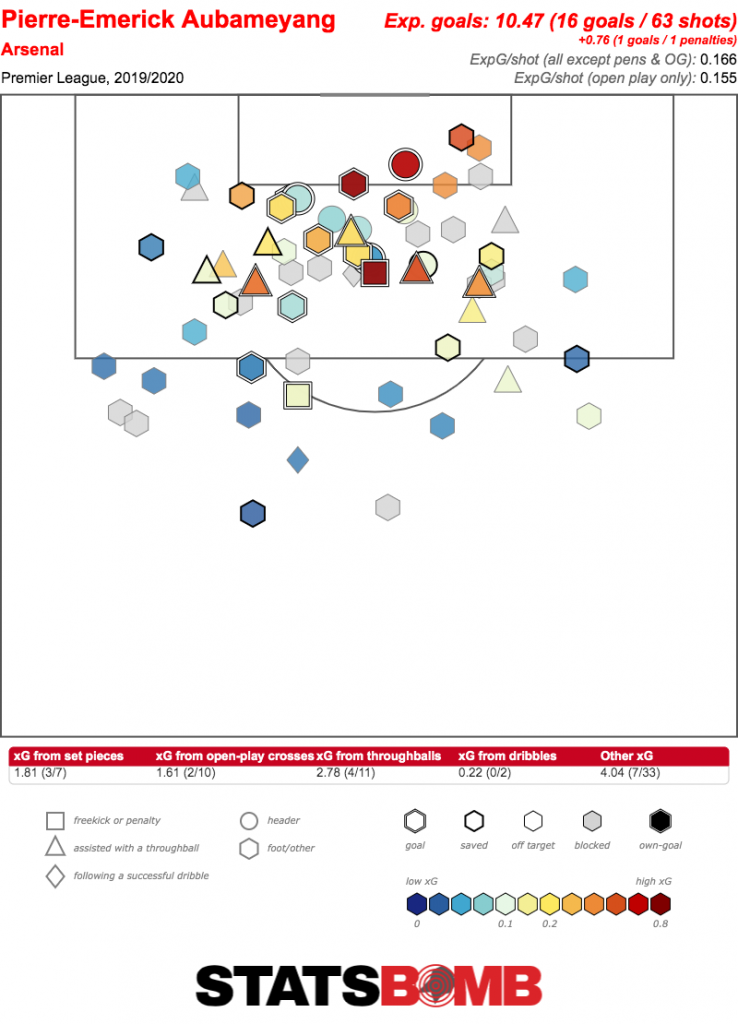 The Arteta project is starting to resemble Jürgen Klopp’s first season at Liverpool. The Europa League final spared some blushes, but the Reds finished eighth in the Premier League that year. The idea of what he wanted was obvious, but between his midseason appointment giving him little coaching time, and the unsuited players he had at his disposal, it was obvious it would be a long time before we saw a side capable of executing his style of play. Then you look at the team he selected for the Europa League final and the issue is staring you in the face: Mignolet; Clyne, Lovren, Touré, Moreno; Can, Milner; Lallana, Firmino, Coutinho; Sturridge. Six of those players have since left Liverpool. One has been injured the entire season, while another is out on the fringes of the first-team squad. Two are occasional backup options. Only Roberto Firmino is a regular starter. As much as he puts a nice face on it, Klopp knew the squad he inherited needed a root and branch reform. Arteta must do the same. What he does have is a seemingly strong core of young players. Even if some of these aren’t yet up to scratch, he should favour their development over persisting with established players who offer more in the short term. If Arsenal are to be back toward the top of the Premier League in three years, it will be with a mix of these young players and new signings. It won’t be with Özil and Lacazette.
The Arteta project is starting to resemble Jürgen Klopp’s first season at Liverpool. The Europa League final spared some blushes, but the Reds finished eighth in the Premier League that year. The idea of what he wanted was obvious, but between his midseason appointment giving him little coaching time, and the unsuited players he had at his disposal, it was obvious it would be a long time before we saw a side capable of executing his style of play. Then you look at the team he selected for the Europa League final and the issue is staring you in the face: Mignolet; Clyne, Lovren, Touré, Moreno; Can, Milner; Lallana, Firmino, Coutinho; Sturridge. Six of those players have since left Liverpool. One has been injured the entire season, while another is out on the fringes of the first-team squad. Two are occasional backup options. Only Roberto Firmino is a regular starter. As much as he puts a nice face on it, Klopp knew the squad he inherited needed a root and branch reform. Arteta must do the same. What he does have is a seemingly strong core of young players. Even if some of these aren’t yet up to scratch, he should favour their development over persisting with established players who offer more in the short term. If Arsenal are to be back toward the top of the Premier League in three years, it will be with a mix of these young players and new signings. It won’t be with Özil and Lacazette.
Stats of Interest
So you may have heard that Liverpool lost to Watford this weekend. I don’t understand how this happened, but it was not a close game of football 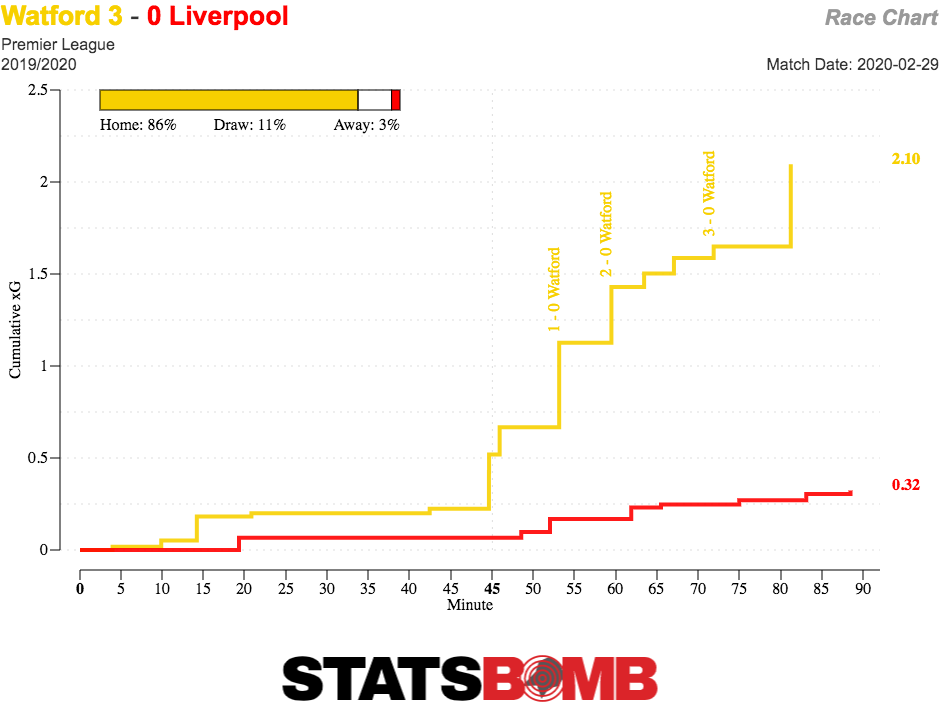 I recently compared Crystal Palace to Joe Biden and, right on cue, they go and win two games in a row. I’m still not sure they’re good, exactly, but the attack has bounced back after cratering.
I recently compared Crystal Palace to Joe Biden and, right on cue, they go and win two games in a row. I’m still not sure they’re good, exactly, but the attack has bounced back after cratering. 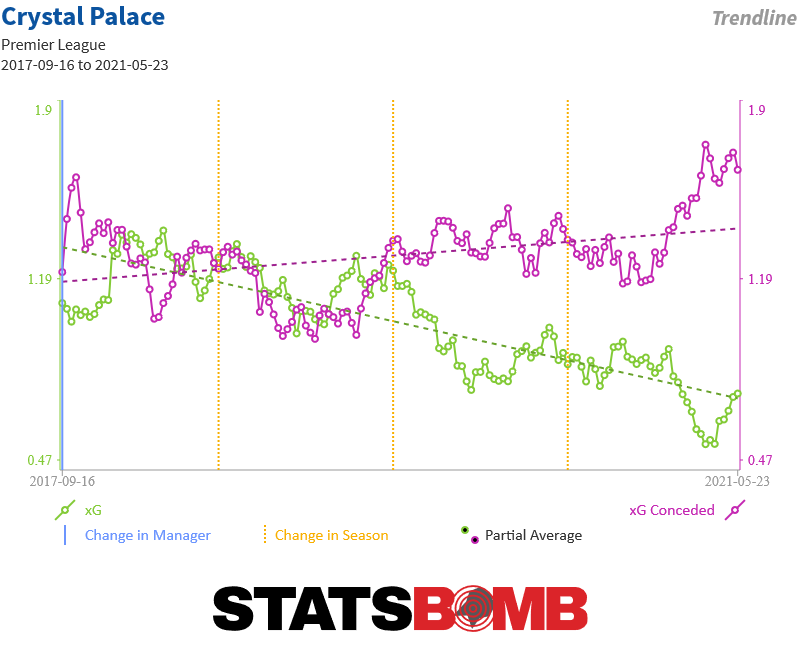 It’s the Manchester derby this weekend. Mike Goodman has written about City’s issues recently, but for United, it seems like Bruno Fernandes really has made a difference. He leads the side in deep progressions per 90 (non-Paul Pogba category), and if you can live with his flaws, there's an interesting player in there.
It’s the Manchester derby this weekend. Mike Goodman has written about City’s issues recently, but for United, it seems like Bruno Fernandes really has made a difference. He leads the side in deep progressions per 90 (non-Paul Pogba category), and if you can live with his flaws, there's an interesting player in there. 